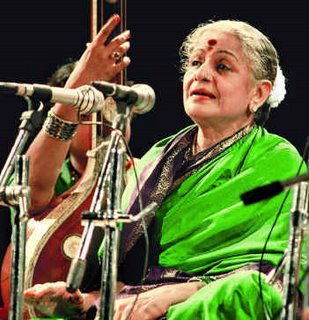Kurai Onrum Illai

This famous song composed by Rajaji (C. Rajagopalachari) is a favorite among many classical music connoisseurs. It has something to do with the lyrics of the song that is quite distinct from most other carnatic kritis in that it does not exhort the Lord to help and protect us. Instead, it says that the person is content with his worshipping of the Lord inspite of His absence. ‘Kurai Onrum Illai’ means that ‘I have no regrets’. The words in Tamil are very lucid and easy to comprehend by the common man. But the main reason most of us remember this song is because of its soulful rendition by M.S. Subbulakshmi. I believe that she was among the first artists from India to be invited to perform at United Nations in New York in 1966. Here’s where she presented this special composition including a benediction verse in English.
Nowadays, every artiste worth his / her name plays to the audience’ requests for this song. I have heard many sing, and cannot but mention that the MS rendition supercedes all other attempts. If you have heard it, you probably know what I am talking about. When MS sings, it not any more about the language, the words, the raga or the tala alone. She takes you to a plane that’s higher than intellectual or musical satisfaction. You can almost feel the devotion in her voice, the empathy in her tone and purity in her breath. And I didn’t realize this overnight. I remember as a child, my father used to sing praises of her and could talk endlessly about her concerts that he had attended. To me, these conversations were rather repetitive and pointless. I was a student of music and quite diligent at it. Even so, I didn’t quite understand the intricacies involved, the ‘bhavam’ and the rest of it that my father pointed out each time I practiced. Even when I got the opportunity to visit MS at her home in Chennai, to sing in her presence and to seek her and her husband Sadasivam’s blessings, little did I realize my good fortune. She has been bestowed with all the awards and honors that a musician can possibly ask for. But the person I met that day was as simple as can be, with a large heart and unsurpassed humility. Today, I look back at that day, and am filled with pride for having such moments in my life to talk about.
After almost 2 years since her death, to most of her fans, MS amma still lives on. To me, she was the most traditional woman in all respects: in her attire that became representative of her style, in her almost complete submission to her husband and in her single-minded devotion to her craft. Yet, she was a pathbreaker and a pioneer, with mighty ambitions and lofty ideals. She was solely responsible for popularizing the Meera bhajans, the Annamacharya kritis and numerous devotional and religious hymns. Can you imagine any other voice chanting the Venkatesa Suprabhatham every single morning at Tirupati temple and countless homes around the world? I wish I could say otherwise, but the truth is that without her, romba kurai irrukku.
